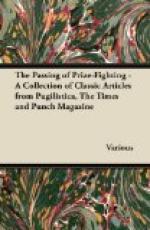* * * * *
The Haunted Bookshop (CHAPMAN AND HALL) is a daring, perhaps too daring, mixture of a browse in a second-hand bookshop and a breathless bustle among international criminals. To estimate the accuracy of its technical details the critic must be a secret service specialist, the mustiest of bookworms and a highly-trained expert in the science and language of the American advertising business. Speaking as a general practitioner, I like Mr. CHRISTOPHER MORLEY best when he is being cinematographic; he hits a very happy mean with his spies and his sleuths, giving a nice proportion of skill and error, failure and success, to both. There is a strong love-interest which will be made much of and probably spoilt by the purchasers of the film-rights; and, though strong men will doubtless applaud hoarsely and women will weep copiously, as the bomb in the bookshop throws the young lovers into each other’s arms, I feel that the book gives a more attractive portrait of Titania Chapman, the plutocrat’s daughter, than ever can be materialised in the film-man’s “close-up.” I am afraid that Mr. MORLEY will not thank me for praising his brisk melodrama at the cost of his ramblings in literature. But, if he has the knowledge, he lacks the fragrance; not to put too fine a point on it, he is long-winded and tends to bore in his disquisitions upon books and bookishness; which is no proper material for a novelist. The story is all about America and is thoroughly American; inevitably therefore there is some ambitious word-coining. The only novelty which sticks in my memory and earns my gratitude is the title for the female Bolshevik, to wit, Bolshevixen.
* * * * *




